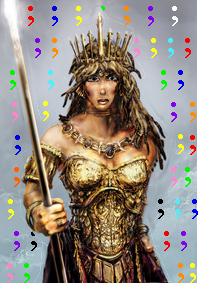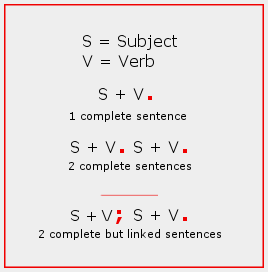Just ♥ Words
 People...! What is wrong with you? Never have so many understood so little about a mere SQUIGGLE on a page.
People...! What is wrong with you? Never have so many understood so little about a mere SQUIGGLE on a page.
Meet Semiramis, warrior princess of Assyria, ruler of the semicolon. She is here to HELP you. You will not refuse her.
Have faith. With a little guidance, you too can master the SEMICOLON—which means that you can don the costume and bear the title "Semiramis of the Semicolon." (Spear not included.)
—Semicolons—
Why use a semicolon?
A semicolon connects two sentences.Think of it as a combination of a period and a comma. Notice the mark has one of each—top & bottom.
Why not use a comma?
The comma is a 90-pound weakling. It's far too weakit can't hold two sentences together.

If you use one, you've got yourself a nasty little comma splice.Why not use a period?
You can. Use a period to end the first sentence. Then start the second sentence.The comma is too weak . It can't hold two sentences together.
When do you use a semicolon?
Sometimes you want to link ideas—two sentences that are related to one another. In that case you can use a semicolon.The comma is too weak ; it can't hold two sentences together.
A semicolon is strong ; it can hold two sentences together.What is a sentence?
A sentence is a complete thought. A period signals the end of that thought. A semicolon can extend the thought—by linking it to another complete but related thought.
Remember—
You must have two complete sentences in order to use the semicolon — S + V on the left ; S + V on the right.
Example—you have two (related) ideas...
Use 2 sentences —> with a period:
• It was too cold to enjoy the game . She decided not to go.
Use 1 sentence —> with a semicolon:
• It was too cold to enjoy the game ; she decided not to go.
________________
Example—you have two (related) ideas...
Use 2 sentences —> with a period:
• It was too cold to enjoy the game . However, she decided to go anyway.
Use 1 sentence —> with a semicolon:
• It was too cold to enjoy the game ; however, she decided to go anyway.
You don't have to use a semicolon to combine two sentences. You can also use a basic conjunction — and, but, so, for, or, not, yet — always (always, always) with a comma.
• It was too cold to enjoy the game , so she decided not to go.
• It was too cold to enjoy the game , but she decided to go anyway.
• It was too cold to enjoy the game , and she didn't want to go anyway.
 It's no secret English is tough to learn. Some of it has to do with homophones and heterophones We've had fun before with words that sound alike but have different spellings and meanings—homophones, like bare and bear.
It's no secret English is tough to learn. Some of it has to do with homophones and heterophones We've had fun before with words that sound alike but have different spellings and meanings—homophones, like bare and bear.
This time we've got heterophones—also known as heteronyms—words that look alike but have diffferent pronounciations and meanings.
Don't You Just ♥ Words?
—Heterophones—
- Clara wound a bandage around his wound.
- Every number makes my mind grow number.
- The dump is full. Sorry, we must refuse your refuse.
- Don't desert me in the desert.
- Startled, the dove dove into the bushes.
- It's ugly, but I don't object to the object.
- No time like the present to present a good idea.
- The oarsmen had a row about how to row.
- She was too close to close the door.
- A handsome buck does like his does.
There are lots of double words with different meanings. Some are spelled alike but sound differently (desert/desert) ... others sound alike but are spelled differently (ore/oar/or). Try a few on your own. It's a fun game for book clubs...or any wordsmiths.
 Show off your smarts with this bit of orthographic trivia—capitonymns, words that are spelled the same, pronouned the same, but change meaning if the first letter is capitalized. Like March and march.
Show off your smarts with this bit of orthographic trivia—capitonymns, words that are spelled the same, pronouned the same, but change meaning if the first letter is capitalized. Like March and march.
Don't You Just ♥ Words?
—Capitonyms—
Ionic
Relating to Ionia a region of Ancient Greece, as in Ionic columns.ionic
Relating to a chemical ion (an atom with an unequal # of protons and electrons)Job
A Biblical character who undergoes great suffering.job
Work, or a task, often for which one receives payment.May
The 5th month of the year of the calendar year.may
An auxillary verb used to express permission or possibility.Lent
For Christians the period between Ash Wednesday and Easter Sundaylent
The past tense of the verb lend, to give something to someone for a period of time.Polish
Relating to Poland, its people, land, or culture.polish
To give a surface of an object a glossy sheen.Scotch
Relating to Scotland in the UK, its people, land, or culture.scotch
To put an end to something, often a rumor, idea, or plan.Turkey
A country in the Meditteranean region.turkey
A large fowl Americans eat for Thanksgiving.Welsh
Relating to Wales in the UK, its people, land, or culture.welsh
To renege (go back) on an agreement
Play a game with your book club. See if you can come up with a few capitonymns of your own.
 In a 30 Rock episode, Jenna stars in a movie, but no one gets the title—"Rural Juror." Jenna keeps calling it "rurur jurur," a hilarious combination of words, which made me want to try a few of my own—Worry Weary ... Arrow 's Error ... Fear of Furor...
In a 30 Rock episode, Jenna stars in a movie, but no one gets the title—"Rural Juror." Jenna keeps calling it "rurur jurur," a hilarious combination of words, which made me want to try a few of my own—Worry Weary ... Arrow 's Error ... Fear of Furor...
Okay, not as funny as Jenna's, but then Tiny Fey's not exactly writing this blog. Still, it got me to thinking about the act of speech, a complicated process that depends on how we shape our hard and soft palates, open our glottis, move our tongue, shape our lips—and the order in which we do it all.
We perform these oral gymnastics with ease in our native languages, almost instinctively, because we've been doing so since childhood. And that's what makes tongue twisters so much fun: they confound our ability to perform our usual verbal gimmicks. Selling sea shells, Peter Piper's pickles, and the wood chuck chucking. Say them fast and you trip up—because you can't move your tongue to the proper position fast enough.
My favorite piece of linguistic trivia isn't quite a tongue twister, but it's close enough to have actually altered the way we say a common word or two.
Don't You Just ♥ Words?
—Thunder—Old English for thunder was thunner—an awkward word due to its phoenetic demands. Say it quickly...and you'll know why the "d" slipped in. It has to do with a slight mistiming—as we move our tongue from the "n" to the "r," says linguist Charles Barber.
This transition calls for two simultaneous movements of the speech organs: (1) the nasal passages are closed by the raising of the soft palate, and (2) the tongue is moved away from the teeth to unblock the mouth-passage. [If there's a mistiming], if the...nasal passages are closed before the tongue moves, a "d" will be heard....
Thus the "d" found its way into the word because it was easier to say. Thunder was was first noticed in the 1300s, but it took another 300 before it was accepted as standard English.
Thimble and bramble are two other words affected by a similar phonetic mistiming, says Barber. They both acquired a middle letter "b."
End of lesson, end of blog post...except to reference Charles Barber's The English Language: A Historical Introduction, Cambridge UP, 2000, p45.
Site by BOOM
![]()
LitLovers © 2024

